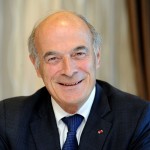What’s your vision this year for the World Energy Council?
Being the year of our World Energy Congress, 2013 offers a timely opportunity for all world leaders to understand our global energy and sustainable development challenges.
This year will also be a year of energy transition for many countries. With the new governments of China and South Korea, along with the second-term US Obama administration, we may see a new set of critical energy policies. 2013 is also a transition year in India before elections take place, and in France where a national debate on energy transition will continue throughout the year.
I am optimistic that countries will share a clear, pragmatic, and ambitious vision for the world, and I hope that 2013 will be a decisive year for the energy world to transition onto the right, clean, and sustainable path.
Moreover, I am confident that 2013 will bring the world closer to reaching consensus on climate change mitigation by signing a global accord in 2015. I also hope 2013 will see concrete outcomes from the UN’s Sustainable Energy for All initiative, in which the WEC closely involved.
What would you like this year’s World Energy Congress to achieve?
It’s significant that the Congress will take place in Asia. Asia is a continent of all superlatives when it comes to energy. It is a centre of gravity for all energy dimensions: whether it be innovations, new infrastructures, disruptive technologies, and behavioral change, we find all of them happening in Asia. The WEC is therefore delighted to seize the opportunity of the 2013 Congress to gain a stronger foothold in Asia, and to enrich its community of energy leaders with Asia’s experiences and expertise.
Also, I would like the Congress to highlight the urgency of the energy trilemma challenge, and to address it by first understanding what options we have. For example, we need all energy technologies as part of a diverse resource mix, and we have to build global governance on the safety of all types of energy.
Lastly, I would like the Congress to build a common shared vision of pragmatism between industry leaders and governments to help put the best policies in place worldwide.
You recently received a Platts lifetime achievement award. What’s the significance of this for the WEC?
The WEC envisions the future energy world to be one with improved governance on both national and global levels if we are to reach our long-term goals of energy security, climate change mitigation, and eradication of energy poverty. This is my lifetime conviction – that we need both market forces and smart regulations. That is why in 2009, I led the WEC in launching our annual assessment of energy and climate policies. The study, now known as the World Energy Trilemma report, assesses policies and practices of more than 90 countries, and thereby helps promote the most efficient policies.
So when I received the Platts award in December, I dedicated it to all the world’s energy leaders who have put in place a sound and efficient frameworks for the peaceful, clean, and acceptable economic development for our future generations.
What were some trends highlighted at the Platts event?
The Platts Global Energy Outlook Forum, which took place before the awards ceremony, highlighted the future of gas and especially shale gas. In the US, shale gas is a game changer which has already sparked a drop in energy prices, re-industrialisation, reduction of imports, and prospect of energy exports, substitution of coal, and reduction of CO2 emissions.
But the Platts event also highlighted the uncertain future that renewable energy is facing given declining subsidy support in the US and Europe, and global production surplus. The technical issues of intermittency, storage, and peak management which have yet to be resolved were also keenly discussed.
Both gas and renewables are undoubtedly energies for our future, but each has their own challenges: for gas it’s about mitigating CO2 emissions, and for renewables it’s about getting closer to competitiveness and providing the technical solution to fully integrating them into the energy system.
Platts recognised your achievements, but what are you most proud of?
Be it at GDF or at EDF, I have always tried to lead strategies to help address the preoccupations of both sustainable development and the global agenda. Both issues are at the core of the WEC’s mission and ambition. Therefore I was happy and proud to be able to prolong and add force to this commitment during my mandate as WEC Chairman.
Pierre Gadonneix is Chairman of the World Energy Council.






_-80_result_688_387_s_c1_c_c.jpg)


